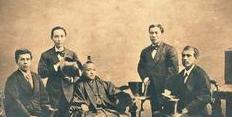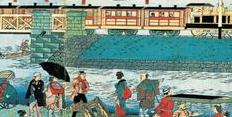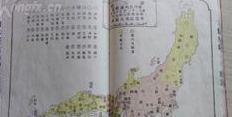明治时期(4)
The Meeji Period(4)
明治時代(じだい)(4)
十九世纪后期,围绕着朝鲜,日本和中国的清朝产生了矛盾。当时朝鲜国内发生了农民的暴动,朝鲜政府向清政府求援,希望清朝派兵镇压。为了与此对抗,日本也派出了军队。在朝鲜境内日军和清军发生了冲突,1894年甲午战争(日本称“日清战争”)爆发。
The conflict between Japan and Shin(Qing, China) over Choosen (Korea) developed at the end of the 19th century. When farmer's riot occurred in Korea, the Korean government asked Qing to send its reinforcement. In opposition of Qing military, Japan also sent its military. When the both militaries came into collision inside Korea, Nisshin Sensoo (the Sino- Japanese War) began in 1894.
19世紀の後半、朝鮮をめぐって日本と清(中国)が対立しました。朝鮮国内で農民の反乱が起こると、朝鮮政府が清に応援の軍隊を求めました。それに対抗して、日本も軍隊を派遣しました。朝鮮国内で、日本と清の軍隊が衝突し、1894年に[日清戦争]が始まりました。
日本战胜的当时的大国清朝,让世界大为震惊。而日本之所以取胜,是由于推行了军队的现代化。
Japan beat the larger country Qing, the big country, so the whole world was surprised. The reason of Japanese win was due to the modernization of its military.
日本が大国の清に勝ち、世界中が驚きました。日本が勝ったのは、軍隊の近代化を進めてきたからです。
战后第二年,日本和清朝的代表在下关进行谈判(签署了《马关条约》)。日本不仅得到了巨额赔款(相当于日本当时三年的国家预算),还割据了*湾和辽东半岛。
In the year after the war, delegates from both countries talked each other and made peace agreement [Shimonoseki Jooyaku (the Shimonoseki Peace Treaty)]. Japan gained a large amount of compensation (same amount as the budget for three years), Taiwan and the Ryootoo (Liaodong) Peninsula.
戦争の次の年、下関に日本と清の代表が集まり、話し合いが行われました[下関条約] 。日本は多額の賠償金(国の予算の3年分)と*湾と遼東半島を得ました。
俄国惟恐日本会不断增强国力,于是联合法国和德国,要求日本归还辽东半岛。日本也惧怕于俄国的实力而将半岛还给了清政府。
But the Russian Empire feared Japan’s growing power and (in cooperation with France and Germany) asked Japan to return the the Liaodong Peninsula. Japan feared the Russian power and returned the peninsula to Qing.
しかしロシアは、日本の力が増すことを恐れ、フランスやドイツとともに、日本に遼東半島を返還するように要求しました。日本はロシアの力を恐れて半島を清に返しました。
欧美各国从日清甲午战争的结果看到了清朝的衰落。趁机瓜分了中国领土,在那里铺设铁道开凿矿山。中国老百姓则在贫穷和西洋人的欺压下备受煎熬。
When Western countries observed the result of the Sino-Japanese War, they realized the decline of Qing. They divided and ruled the territory of China and deprived it of its railways and mines. The Chinese people suffered from poverty and discrimination from the Western people.
欧米の国々は、日清戦争の結果を見て、清の力の衰えを知りました。そして、中国の領土を分割支配し、鉄道や鉱山を奪いました。中国の人々は、貧しさと欧米人からの差別に苦しみました。
由于沙俄从中国的东北逐渐将实力扩展到朝鲜半岛,日本和俄国的对立也日益尖锐。1904年终于爆发了战争(即日俄战争)。
Because Russia extended its power from the northeast part of China to the Korean Peninsula, the conflict between Japan and Russia escalated. In 1904, Nichiro Sensoo (the Russo-Japanese War) began.
ロシアが、中国東北部から朝鮮半島にも勢力を伸ばしたので、日本とロシアの対立が激しくなりました。1904年に、日本とロシアの戦争が始まりました[日露戦争] 。
虽然日本方面在战局上争得了上风,但同时也伤亡惨重。同时沉重的军费负担则使老百姓深受其苦。在俄国,深受苦难的人民终于爆发了革命。
The war was victorious for Japan, but many person were killed in battle. People also suffered from a great war expenditure. Russian people who suffered from the war raised a revolution.
日本は有利に戦いを進めましたが、多くの戦死者が出ました。戦争の費用の負担も国民を苦しめました。ロシアでは、戦争に苦しむ国民が革命を起こしました。
日本和俄国都没有继续打下去的力量后,终于签署了≪朴次茅斯和约≫,双方和解。俄国同意将在满*的铁道权益和库页岛的南半割让给了日本。同时还同意让日本在朝鲜发展势力。
日本もロシアも戦争が続けられなくなり、ポーツマス条約を結び、和解しました。ロシアは、満*の鉄道の権利や樺太の南半分を日本にゆずりました。日本が朝鮮に勢力をのばすことも認めました。




